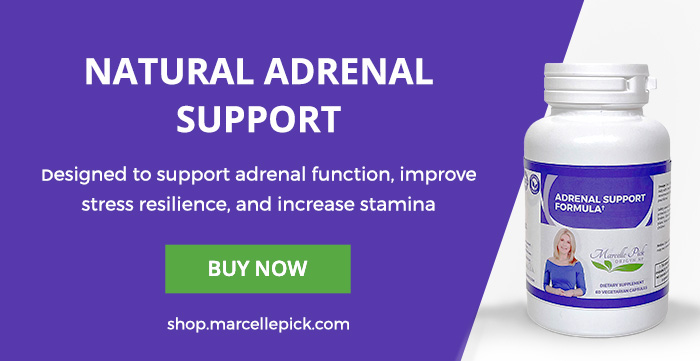We are a nation of exhausted women who suffer from adrenal fatigue. Yes, it’s true. Women come to me all the time, fatigued to the point of barely being able to get out of bed. They are on the brink of collapse, even when their lives look amazing. Understanding what causes adrenal fatigue for these women is what I’ve dedicated my practice to.
I understand feelings of women with adrenal fatigue well. I remember a time when I couldn’t walk from my kitchen to my living room without needing to sit down in the hall to rest. It was a crazy time in my life. I was juggling parenting three young children, including newborn twins, while trying to keep up with a busy medical practice. I was always “on,” until I simply couldn’t be anymore.
Constant stress – even when it comes from good things – keeps your body on high alert. You see, your body doesn’t know the difference between a real threat and a perceived “threat.” All it knows is that your flight-fight response has been activated, and there’s a need for action. And being always at the ready means consistently elevated cortisol levels, which can lead to a whole bunch of unpleasant symptoms, exhaustion at the forefront!
In addition to feeling unable to function, those who suffer from adrenal fatigue may experience mood swings or depression, hair loss, weight gain, weakness and much more. Sounds awful, doesn’t it? Trust me, it is! Let’s understand more about what causes adrenal fatigue and the effects of high cortisol levels.
Adrenal Fatigue Symptoms: Why It’s Important to Test
Because I know first hand what it feels like to be experiencing adrenal fatigue symptoms, I know how important it is to find answers. When a woman comes into my clinic exhibiting signs of adrenal imbalance, the first thing I do is put her through a series of tests to look at stress markers, including DHEA and cortisol levels. What I’ve found is incredible; after testing thousands of women, it’s clear that we have a major issue to address. Seventy-five percent of these women had cortisol levels that indicated impaired function in their adrenal glands – some mild, but far too many in the more serious range.
There are many terms to describe this condition – adrenal exhaustion, adrenal burnout, adrenal fatigue. I think that “adrenal imbalance” really illustrates what’s going on. At the root of the issue is the hormonal imbalance that results from your adrenal glands producing either too much or too little of your stress hormones. If the output doesn’t match what your body requires, these worrisome symptoms can appear. Whatever you call it, the most important thing is to recognize that adrenal fatigue is real, and there is something you can do about it!
You might be thinking that it’s impossible to reduce your stress level. I understand completely – at the peak of my adrenal imbalance, it didn’t look like there was room for anything to give. But step by step, I learned how to get back to a place of vitality and energy. And you can too!
What Causes Adrenal Fatigue?
So many women endure stress all day – and often long into the night! We’re caring for families, pursuing careers, trying to keep up in an increasingly digital world where people can reach you any time of day or night with the touch of a button. When the sun goes down, we don’t relax and get ready for sleep like our ancestors did – we turn on the lights and clean the house, do the laundry, watch tv or respond to email.
Stress can be mundane or traumatic, the emergency real or perceived. Whatever the source, your body will respond the same way; your survival response will kick in and your adrenal glands will increase their output of adrenaline and cortisol. Let’s go further into what causes adrenal fatigue for so many women.
Connection Between Chronic Stress, High Cortisol and Adrenal Imbalance
Cortisol is a natural, necessary hormone that converts fats and protein into energy. This allows you to be alert, helps keep your heart beat and blood pressure stable, and fights inflammation – all great things in the short term. It’s when cortisol levels stay high long term that we have a problem.
Damage Sustained from High Cortisol Levels
- Impeding normal cell regeneration and healing
- Disrupt healthy function of your endocrine system including your thyroid
- Redirecting molecules needed to make other vital hormones
- Deteriorating immune system functioning
- Difficulty with digestion, metabolism and mental functioning
When your adrenals are constantly receiving a call for help in response to stress, it becomes increasingly more difficult for these hard-working glands to produce cortisol and other key hormones, like DHEA, estrogen, progesterone and testosterone. This can have a huge impact on women, particularly in perimenopause or menopause when she relies upon her adrenals to avoid major fluctuations of her sex hormones. That’s one reason so many women find it more difficult to continue doing what they’ve always done as they enter mid-life.
Three Scenarios of Adrenal Fatigue
Adrenal imbalance tends to show up most often in women between the ages of 35 and 55. There are three distinct manifestations:
- You can’t slow down and feel constantly “wired,” even when you’re exhausted. You find yourself feeling worn out, but can’t seem to stop. There’s so much adrenaline and cortisol in your system, you’re left in a constant “hyper-active” state.
- You can’t sleep at night, and you can’t get out of bed in the morning. Your cycle is upside down, leaving you feeling alert and awake in the middle of the night, but dragging in the morning. It takes a long time to fall asleep, and even when you do you often wake up ready to go at 2 am.
- It’s a challenge simply to move. You feel more than just weary – you simply have no energy at all. This may be accompanied by intense food cravings and weight gain you can’t explain.
 As if all of those things aren’t enough, adrenal imbalance can also be a factor in a wide range of other critical conditions: fibromyalgia, hypothyroidism, insulin resistance, chronic fatigue syndrome, arthritis and depression, to name just a few. So, there’s good reason to look closely at what causes adrenal fatigue in order to take steps to heal those adrenals.
As if all of those things aren’t enough, adrenal imbalance can also be a factor in a wide range of other critical conditions: fibromyalgia, hypothyroidism, insulin resistance, chronic fatigue syndrome, arthritis and depression, to name just a few. So, there’s good reason to look closely at what causes adrenal fatigue in order to take steps to heal those adrenals.
Adrenal Fatigue Treatment
There are so many things you can do if you know what causes adrenal fatigue for you. If you have mild to moderate adrenal imbalance that might keep more serious symptoms at bay, you’re even better of. The sooner you recognize what’s happening in your body, the more likely you can avoid the desperate state I found myself in. By answering a few simple questions, you’ll be able to identify small steps you can take to get big results.
How is the Way You Are Eating Supporting Your Natural Cortisol Curve?
Did you know, what you eat matters for healthy adrenal balance? And when you eat matters just as much as what you eat. You want to keep your energy levels stable all day long, and you can do so by eating three nutritious meals and two snacks, rather than skipping meals or eating too late at night. But I’m not saying what you eat doesn’t matter. It does! Cutting down on refined carbohydrates – sugar, potatoes, white rice, and white flour, for instance, can help keep your blood sugar levels consistent, rather than having huge spikes and drops all day long. I understand that it might be hard to change your current habits, so start small; maybe choose whole grains instead of white rice, or eat one cookie instead of three.
How Do Supplements Support My Adrenal Glands, and Which Ones Are Best?
It’s so tough to get everything you need from food, so taking natural supplements for adrenal imbalance is usually recommended. Hormonal balance impacts adrenal health, and a high-quality multivitamin/mineral supplement, along with essential fatty acids, helps support this balance. Try my Multi Essentials and EPA/DHA Support for a healthy boost. My Sleepless Adrenal Program combine these vital supplements with specific support for your own adrenal issues. Whether you’re wired, tired, or need extra sleep support, there’s a program right for you.
What Lifestyle Changes Can I Make to Bring My Adrenals Back into Balance?
I always recommend you have a full physical exam to rule out any underlying medical problems that could be causing your symptoms. But if you’ve been cleared, it’s time to look at the way you are living, and the impact that could be having on your adrenals. You may not be able to get rid of stress – or even reduce it much – but you can change how you react. Are you making sure you leave time in your life for self-care? Have you made a list of the stressors present to determine if there are changes – even tiny ones – that you can make? Understanding where your stress is coming from, and what causes adrenal fatigue for you, can help you change your life in ways that work for you. Don’t forget to schedule plenty of time for sleep. Your body can’t heal if it’s constantly on the go!
How Do I Process Emotional Stressors – Which Are Just as Damaging as Physical Stress?
There’s a fascinating study, the Adverse Childhood Experiences (ACE) study, that revealed that past stress can take a toll on your body, even decades later. If you’re carrying around past hurts, guilt, anger, or relationship issues it could be having a much bigger impact on you than you know. Taking the time to examine and address these old stressors just might be the key to feeling better.
Recovering from Adrenal Fatigue
Unless you have an extreme case of adrenal fatigue, I expect that you would see big results in just a few months – possibly sooner if your adrenal imbalance is mild to moderate. While that might seem like a long time, remember that it likely took years of constant stress to get you to this place. Even if you feel too exhausted right this moment to make any changes at all, you’ve already done the most important step – seeking out information from someone who has been there! Now that you know what causes adrenal fatigue, you can make the tiny changes to get you started on recovering from adrenal fatigue. As you feel better with each new strategy, you’ll build the stamina you need to keep going. It will be well worth it when you reach the end – and feel better than you have in years!










